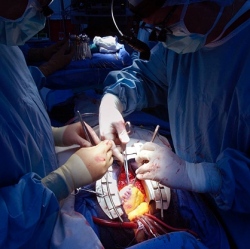
Deep within most tumors lie areas that remain untouched by chemotherapy and radiation. These troublesome spots lack the blood and oxygen needed for traditional therapies to work, but provide the perfect target for a new cancer treatment using bacteria that thrive in oxygen-poor conditions.
Now, researchers have shown that injections of a weakened version of one such anaerobic bacteria, the microbe Clostridium novyi, can shrink tumors in rats, pet dogs, and a human patient. The findings from BioMed Valley Discoveries and a nationwide team of collaborators demonstrate that C. novyi-NT, a version without the ability to make certain toxins, can act as a new type of "biosurgery" to eat away tumors in hard to reach places.
The bacteria excise tumor tissue in a precise, localized way that spares surrounding normal tissue. The study, which represents a new take on an approach first attempted a century ago, indicates that further testing of this agent in selected patients is warranted.
"We have encouraging signs that this bacteria could be used to treat certain inoperable tumors, and that could give hope to some patients who don’t have any other options," said Saurabh Saha, M.D., Ph.D., a longtime cancer researcher at BioMed Valley Discoveries and senior author of the study. "But we are still in the early stages, and need to further assess the safety and efficacy of the treatment, as well as explore how well it works in combination with other cancer therapies."
The idea of using bacteria to combat cancer dates back to the 1890’s, when cancer researcher William Coley noticed that some patients who developed postsurgical infections went into remission or were even cured of their disease. Despite the approach’s initial promise, progress was slow for the next century.
Over a decade ago Bert Vogelstein, M.D., a cancer researcher at the Johns Hopkins School of Medicine and one of the study co-authors, tested a number of microbes before identifying a particularly promising one called Clostridium novyi. Because C. novyi is exquisitely sensitive to oxygen, it would grow inside the oxygen-poor core of tumors but stop once it reached healthy tissue.
In previous studies, Vogelstein and his colleagues tamed the bacteria further by removing its ability to make toxins and then injected it intravenously into laboratory animals. Though the bacterial treatment had dramatic effects in a third of the mice and rabbits, no complete responses were seen in dogs with naturally occurring cancers.
